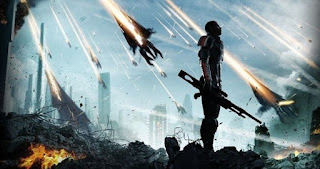Mass Effect Trilogy
The Citadel, the colossal space station at the heart of galactic civilization, serves as both a political hub and a symbol of the mysteries that permeate the Mass Effect universe.
Each of the Citadel's five arms hosts thousands of residential and commercial structures, including the headquarters of the Galactic Council and the embassies of numerous species populating the galaxy.
A Universe Steeped in Mystery
At the core of Mass Effect's allure is its expansive and intricately crafted universe. Ancient alien races like the Protheans have mysteriously vanished, leaving behind advanced technology and enigmatic ruins. Central to the galaxy's infrastructure is the Citadel, an immense space station discovered by current civilizations but built by unknown predecessors. The Citadel is maintained by the Keepers, silent arachnid-like beings biologically programmed to ensure the station's functionality—a testament to the game's blend of science fiction with elements of high fantasy.
Players assume the role of Commander Shepard, a character whose gender, appearance, and backstory you can customize, adding a personal touch to the narrative. Shepard's journey from a skilled Alliance soldier to the first human Spectre—an elite agent of the Citadel Council—forms the backbone of the story. Tasked with stopping a rogue Spectre named Saren Arterius, Shepard uncovers a threat far greater than political treachery: the Reapers, ancient sentient machines intent on eradicating advanced organic life.
Rich Tapestry of Alien Races and Cultures
Mass Effect shines in its portrayal of a diverse galaxy teeming with alien species, each with its own history, culture, and political agendas. From the militaristic Turians and the scientific Salarians to the enigmatic Asari and the nomadic Quarians, the game invites players to delve into interstellar diplomacy and racial tensions. Humanity's struggle to find its place among these established species adds depth to the narrative and challenges players to navigate complex relationships.
The main alien races in Mass Effect offer a rich diversity that enhances the game's immersive storytelling. While these are the primary species, the galaxy is home to many more.
The Shadowy Presence of Cerberus
While Cerberus—the pro-human organization led by the enigmatic Illusive Man—plays a more prominent role in later installments, hints of its activities are present in the first game. Cerberus operates in the shadows, often engaging in unethical experiments to advance humanity's dominance in the galaxy. Their actions set the stage for moral dilemmas that Shepard will face in future adventures.
The gameplay in the fight scenes is frenetic, yet strategic and perfectly balanced.
Biotics: The Science of Extraordinary Abilities
Mass Effect introduces Biotics, individuals who can manipulate dark energy to produce telekinetic effects. Unlike the mystical "Force" in Star Wars, biotics are explained through scientific phenomena involving exposure to the fictional element zero. This grounding in science fiction enhances the believability of these powers and integrates them seamlessly into both gameplay and story.
Interactive Storytelling at Its Finest
One of Mass Effect's greatest strengths is its commitment to player agency. Conversations unfold through a dialogue wheel that allows for nuanced interactions, affecting relationships and plot outcomes. Choices between Paragon (morally upright) and Renegade (pragmatic or ruthless) actions enable players to shape Shepard's personality and moral compass.
Gameplay Mechanics
The game blends third-person shooter combat with role-playing elements. Players assemble a squad from a cast of well-developed characters, each with unique abilities and backgrounds. Combat involves strategic use of weapons, tech skills, and biotics, encouraging diverse playstyles. While some mechanics may feel dated compared to modern standards, they were innovative at the time and contribute to an engaging experience.
Expanding the Lore Beyond the Game
For those eager to delve deeper into the Mass Effect universe, a wealth of additional media awaits:
- Novels like Mass Effect: Revelation explore Captain Anderson's past and his fraught history with Saren, adding layers to their in-game relationship.
- Comics such as Mass Effect: Redemption bridge the gap between the game's sequels, offering insights into character motivations and unseen events.
- The animated film Mass Effect: Paragon Lost provides backstory on squadmate James Vega, enriching the narrative tapestry.
These expansions not only enhance the main storyline but also flesh out side characters and events, making the universe feel alive and interconnected.
The Reapers begin their assault on Earth in Mass Effect 3, a culmination of the threats unveiled in the first game.
The Verdict
Describing Mass Effect in its entirety within a single article is an impossible feat. The saga unfolds across a trilogy of video games, a fourth installment—Mass Effect: Andromeda—a plethora of comics, several novels, and even an animated film. The only true way to immerse oneself in this world is to dive into the games—interactive films in their own right—punctuated by intense and engaging moments of action. Simultaneously, the supplementary narratives available through various media are not mere side stories but integral parts of the overarching tale, rich with events and character development.
Mass Effect stands as a container of a marvelous video game trilogy, but for those insatiable consumers of fantastic worlds, it offers other beautiful stories told through books, comics, and a short film that are absolutely worth considering. The foundational idea of this science fiction universe is undoubtedly an artistic work on par with—or nearly so—franchises like Star Wars and Star Trek.
Pros:
- Deep and Engaging Narrative: A complex story that intertwines personal choice with grand-scale events.
- Memorable Characters: A diverse cast with compelling backstories and development arcs.
- Expansive Universe: Rich lore that extends beyond the game into books, comics, and films.
- Moral Choices: Decisions have significant impacts on the storyline and character relationships.
Cons:
- Dated Mechanics: Some gameplay elements may feel clunky to players accustomed to modern controls.
- Uneven Pacing: Exploration segments can occasionally slow down the momentum of the main plot.
| Score | Rating |
|---|---|
| PS3 Game | 98% |
| PC Game | 98% |








Comments
Post a Comment